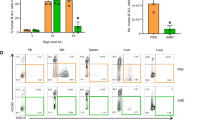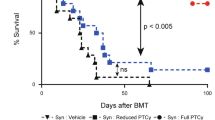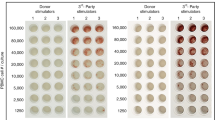Abstract
Thiotepa (TT) has long been considered for inclusion in clinical bone marrow transplant (BMT) conditioning regimens in an attempt to prevent allograft rejection and leukemia relapse. These studies have been encouraged by initial murine experiments showing a clear improvement in allogeneic bone marrow engraftment with addition of TT to total body irradiation (TBI) where it was assumed that TT enhances donor-type chimerism via ablation of competing stem cells in the recipient. The aim of the present study was to re-evaluate the hematological toxicity of TT among different stem cell subsets that included primitive cells capable of long-term repopulation and to assess how the combination of TT with TBI influences the development of donor engraftment in both syngeneic (B6-Gpi-1a → B6-Gpi-1b) and H-2 compatible allogeneic (BALB.B10 → B6) BMT models. At 24 h after TT (20 mg/kg) the femoral content of different stem cell subsets was determined from the frequency of transient repopulating, and the more primitive cobblestone area-forming, cells (CAFCs) growing in stroma-supported cultures. This assay showed a large TT-induced depletion (2% survival) of early clones developing at day 7 in culture but survival recovered towards normal for later appearing clones developing from more primitive CAFC subsets. The sparing of these primitive stem cells was reflected as undetectable levels of donor marrow repopulation in recipients given TT followed by syngeneic BMT. Addition of TT to TBI did not significantly improve long-term engraftment of syngeneic marrow while this combination had a dramatic effect in allogeneic BMT by preventing allograft rejection. In this respect TT shares similar properties with cyclophosphamide and suggests that the large improvement of allogeneic stem cell engraftment is attributable to the immune suppressive properties of TT rather than to its toxicity against host primitive stem cells.
This is a preview of subscription content, access via your institution
Access options
Subscribe to this journal
Receive 12 print issues and online access
$259.00 per year
only $21.58 per issue
Buy this article
- Purchase on Springer Link
- Instant access to full article PDF
Prices may be subject to local taxes which are calculated during checkout
Similar content being viewed by others
Author information
Authors and Affiliations
Rights and permissions
About this article
Cite this article
Down, J., Westerhof, G., Boudewijn, A. et al. Thiotepa improves allogeneic bone marrow engraftment without enhancing stem cell depletion in irradiated mice. Bone Marrow Transplant 21, 327–330 (1998). https://doi.org/10.1038/sj.bmt.1701103
Received:
Accepted:
Published:
Issue Date:
DOI: https://doi.org/10.1038/sj.bmt.1701103
Keywords
This article is cited by
-
Comparison of reduced-toxicity conditioning protocols using fludarabine, melphalan combined with thiotepa or carmustine in allogeneic hematopoietic cell transplantation
Bone Marrow Transplantation (2021)
-
Hematopoietic reconstitution of neonatal immunocompetent mice to study conditions with a perinatal window of susceptibility
Scientific Reports (2018)
-
Safety and efficacy of thiotepa-based conditioning for allogeneic transplantation in AML: a survey from the ALWP of the EBMT
Bone Marrow Transplantation (2017)
-
Second hematopoietic SCT in patients with thalassemia recurrence following rejection of the first graft
Bone Marrow Transplantation (2008)
-
Individualizing high-dose oral busulfan: prospective dose adjustment in a pediatric population undergoing allogeneic stem cell transplantation for advanced hematologic malignancies
Bone Marrow Transplantation (2000)



